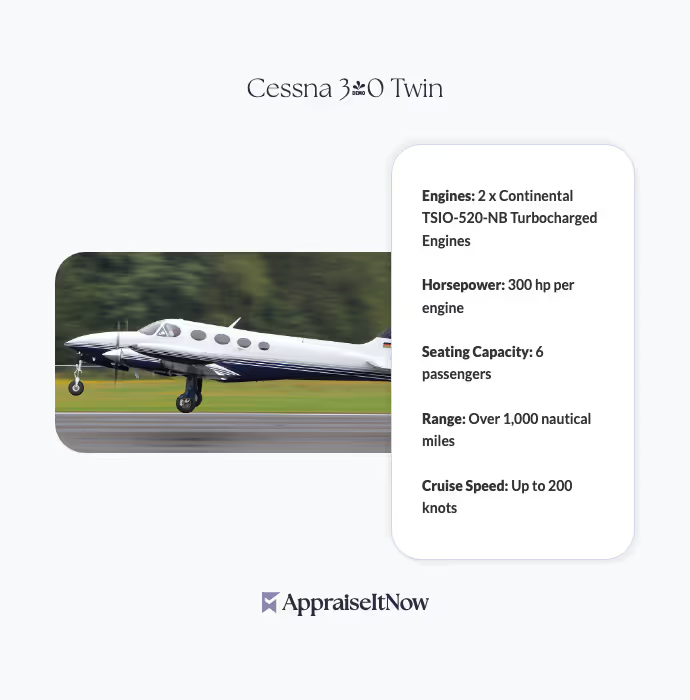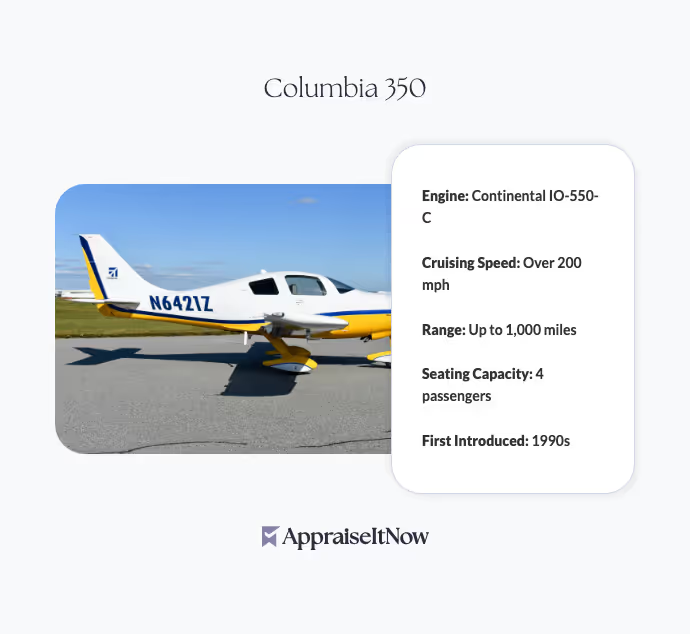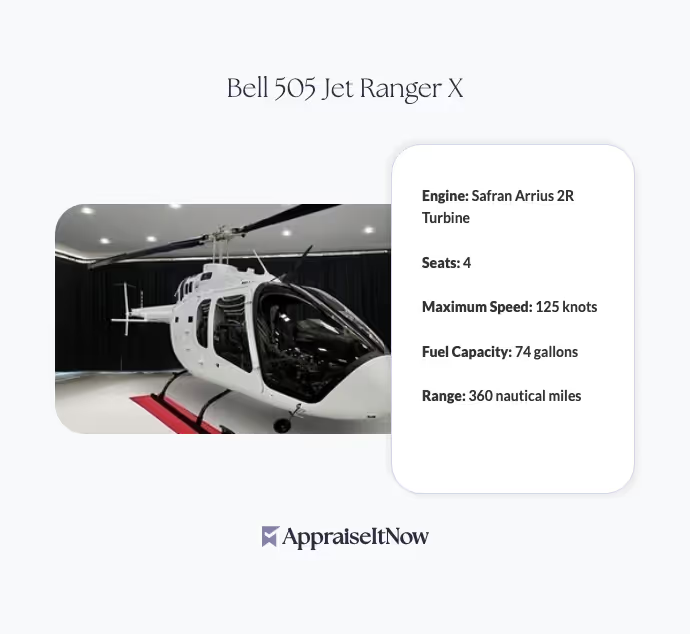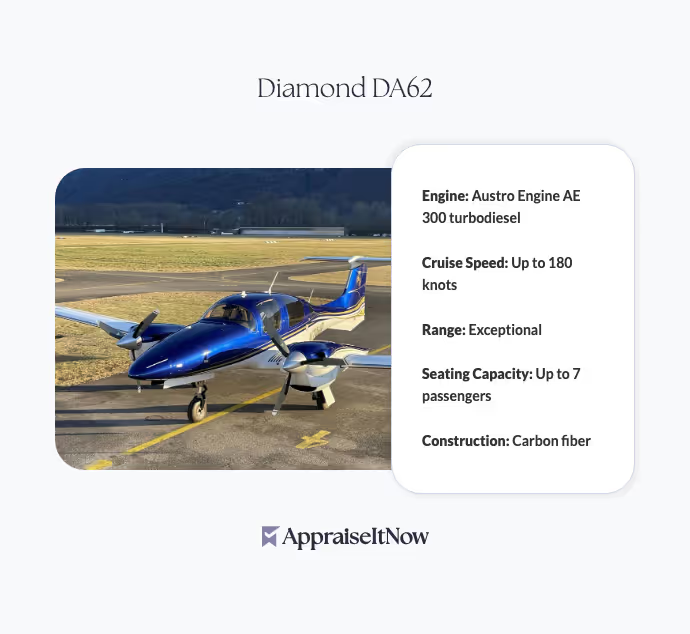<h1>How to Get Your Cessna 340 Twin Appraised</h1>
<p>The Cessna 340 Twin represents a significant aviation asset, with current market values ranging from <strong>$135,000 to $175,000</strong> for well-maintained examples. Whether you're buying, selling, or verifying insurance coverage for this twin-engine aircraft, understanding how to obtain an accurate appraisal ensures you have reliable documentation and fair market valuation.</p>
<h2>Understanding Cessna 340 Twin Market Value</h2>
<p>The Cessna 340 Twin commands strong interest in today's aviation market, reflecting its reputation as one of the most capable and popular twin-engine piston aircraft ever produced. Introduced in 1972 and manufactured through 1984, this aircraft earned its market position through exceptional engineering and proven performance across personal and business aviation sectors.</p>
<p>What makes the Cessna 340 hold its value so effectively? The answer lies in its distinctive combination of technical capabilities and practical design. With turbocharged engines, a spacious six-seat cabin, and cruising speeds reaching 200 knots, your aircraft offers capabilities that continue to attract serious buyers even decades after production ended. The aircraft's fuel-efficient design and advanced avionics systems further enhance its appeal, positioning it as a relatively premium investment within the general aviation market.</p>
<div class="callout tip"><p><strong>Market Insight</strong></p>
<p>Cessna 340 Twin aircraft with complete maintenance records, recent engine overhauls, or modern avionics upgrades typically command premium valuations within the $135,000-$175,000 range.</p></div>
<h2>Key Specifications That Impact Appraisal Value</h2>
<p>Your Cessna 340 Twin's valuation depends on several interconnected technical and operational factors. The aircraft's turbocharged engines and impressive 1,000+ nautical mile range make it particularly valuable for both personal travel and business applications, differentiating it from comparable single-engine alternatives. Understanding these specifications helps you prepare for the appraisal process and recognize what makes your particular aircraft distinctive.</p>
<p>Aircraft condition represents the primary value driver. Appraisers evaluate engine time, airframe hours, and maintenance history extensively when conducting <a href="/types/airplane">aircraft appraisals</a>. A Cessna 340 Twin with low total time and meticulously documented service records will appraise significantly higher than one with deferred maintenance or unclear history. The aircraft's interior condition, exterior paint and corrosion status, and functional avionics systems all factor into the final valuation.</p>
<p>Modification history also influences value substantially. Modern glass cockpit upgrades, enhanced interior refurbishment, or engine modifications can either increase or decrease your aircraft's worth depending on execution quality and market perception. Professional appraisers understand which modifications enhance market appeal versus those that might concern potential buyers.</p>
<h2>Why Professional Appraisal Matters for Aircraft</h2>
<p>Obtaining a certified appraisal from credentialed aviation experts provides essential documentation that extends far beyond simple value estimation. When you need accurate valuation for <a href="/types/commercial-aircraft">aircraft-related purposes</a>, whether insurance coverage, estate planning, or purchase-and-sale transactions, professional appraisals deliver the documentation that financial institutions, insurance companies, and legal professionals require.</p>
<p>Your appraisal serves multiple critical functions. Insurance companies demand current valuations to establish appropriate coverage limits and replacement cost documentation. Tax authorities require professional appraisals for charitable donation substantiation and estate valuation purposes. Lending institutions utilize certified appraisals when aircraft serve as collateral for financing. Each of these scenarios demands the credibility and detail that only USPAP-compliant professional appraisals provide.</p>
<div class="callout note"><p><strong>Critical Detail</strong></p>
<p>Insurance carriers typically require appraisals no older than 12-24 months to reflect current market conditions, making periodic revaluation essential for maintaining accurate coverage.</p></div>
<h2>Preparing Your Aircraft for Appraisal</h2>
<p>Before a certified appraiser arrives, organizing comprehensive documentation dramatically improves valuation accuracy and expedites the appraisal process. Compile your aircraft's logbooks showing complete maintenance history, engine overhaul records, and any major repairs or modifications performed. Include all airworthiness directives, service bulletins, and compliance documentation. Gather records of recent inspections, avionics upgrades, and interior refurbishment work.</p>
<p>Your appraisal expert will conduct a thorough physical inspection examining structural integrity, engine condition, flight systems functionality, and overall maintenance standards. Having your aircraft clean, accessible, and mechanically ready for inspection demonstrates proper maintenance and supports higher valuations. Prepare a list of any recent work completed, planned maintenance, or known discrepancies so the appraiser understands the aircraft's current operational status fully.</p>
<p>Modern aircraft appraisals incorporate condition photography from multiple angles, comprehensive measurement documentation, and detailed system evaluations. Some appraisers request avionics specifications, fuel system capacity confirmation, and operational limitations documentation. Having this information readily available streamlines the appraisal process and ensures nothing impacts the final valuation due to incomplete information.</p>
<h2>Comparison and Market Context</h2>
<p>Understanding your Cessna 340 Twin's position within the broader aviation market helps contextualize your appraisal valuation. The aircraft occupies a unique middle ground—more capable than single-engine competitors yet more economical than higher-performance twins. How much does a new Cessna 340 cost today? Cessna ceased production in 1984, so all examples are now pre-owned aircraft. This production timeline creates interesting market dynamics where well-maintained 1980s examples sometimes command valuations comparable to 1970s aircraft, reflecting the importance of condition over age.</p>
<p>The question "Do Cessnas hold their value?" receives a qualified affirmative answer, particularly for twins like your 340. While specific values fluctuate based on market conditions, fuel costs, and economic factors affecting general aviation activity, Cessna twins consistently maintain strong residual value. This stability reflects the aircraft's reputation for reliability and the substantial pilot training investment required to operate twin-engine aircraft safely. For insights into broader <a href="/types/commercial-aircraft">aviation valuations</a>, understanding market dynamics helps you interpret your specific appraisal within industry context.</p>
<p>Comparing your aircraft against recent comparable sales provides market verification. Your appraiser will research documented sales of similar Cessna 340 Twin aircraft, considering factors like aircraft year, total time, avionics equipment, and maintenance records. This comparative market analysis ensures your valuation reflects actual market conditions rather than theoretical pricing.</p>
<div class="callout tip"><p><strong>Valuation Strategy</strong></p>
<p>Aircraft with lower total time, recent major overhauls, and complete maintenance documentation typically command the upper range of the $135,000-$175,000 valuation spectrum.</p></div>
<h2>Cost Considerations and Operational Factors</h2>
<p>Understanding ownership costs helps contextualize your aircraft's value within your personal financial picture. How much does it cost to own a Cessna 340? Annual fixed costs including hangar, insurance, and mandatory inspections typically range from $8,000 to $12,000 for well-maintained aircraft. Engine overhaul expenses represent the largest potential cost variable, as Cessna 340 Twin engine overhauls typically cost $40,000 to $60,000 per engine when required. These substantial operating costs influence purchase decisions and appraisal values, as they determine whether aircraft ownership remains economically feasible for potential buyers.</p>
<p>Fuel efficiency contributes directly to your aircraft's market appeal and valuation stability. The Cessna 340's reputation for fuel-efficient twin-engine operation means operating costs, while substantial, remain manageable compared to less efficient competitors. This operational efficiency translates to market value preservation, as buyers seeking twin-engine capability frequently prioritize fuel economy alongside performance characteristics.</p>
<p>For detailed guidance on understanding aircraft ownership expenses and their relationship to market valuation, explore resources on <a href="/types/equipment-and-machinery">equipment and machinery appraisals</a> and operational cost analysis. Appraisers familiar with aviation economics understand how maintenance forecasts and operating cost trends influence buyer psychology and therefore market valuation.</p>
<h2>Geographic and Regulatory Considerations</h2>
<p>Your Cessna 340 Twin's appraisal value reflects geographic market conditions and regulatory environments. Aircraft based in regions with higher general aviation activity typically command slight valuations premiums compared to aircraft in areas with limited flight training or business flying demand. Similarly, aircraft with fresh airworthiness certifications and current medical certifications for all pilots appraise higher than those requiring regulatory compliance work.</p>
<p>International variants or aircraft with unique equipment configurations may experience valuation adjustments. Your appraiser will identify any aircraft-specific features or modifications that enhance or detract from standard market value. Aircraft equipped with modern glass cockpit avionics systems, for example, frequently command significant premiums over steam-gauge equipped examples, reflecting the substantial cost and operational advantages of upgraded systems.</p>
<h2>The Role of Maintenance Records</h2>
<p>Complete maintenance documentation represents the single most important factor influencing your Cessna 340 Twin's appraisal value. Aircraft with meticulous logbook maintenance, documented compliance with all applicable airworthiness directives, and regular inspection records appraise significantly higher than aircraft with incomplete records or deferred maintenance. Buyers and lenders rely heavily on maintenance history to assess ongoing reliability and forecast future operating costs.</p>
<p>When major components like engines, propellers, or avionics have low time since last major service or replacement, document this clearly. Engine reserve fund accounting—where you've accumulated funds for anticipated overhaul costs—actually supports higher valuations by demonstrating responsible ownership and financial planning. Conversely, aircraft approaching mandatory overhaul requirements or displaying deferred maintenance typically see valuations reduced to reflect buyer obligations for bringing the aircraft into full compliance.</p>
<div class="callout note"><p><strong>Key Appraisal Factor</strong></p>
<p>Comprehensive logbook documentation demonstrating continuous professional maintenance typically increases valuation by 10-15% compared to aircraft with equivalent condition but incomplete records.</p></div>
<h2>Connecting to AppraiseItNow Services</h2>
<p>When you're ready to obtain your professional Cessna 340 Twin appraisal, connecting with credentialed aviation experts ensures accurate, USPAP-compliant valuation that satisfies insurance companies, lenders, and legal professionals. AppraiseItNow connects aircraft owners with certified appraisers holding credentials from organizations like AAA, ISA, and ASA, ensuring expertise specific to your aircraft type and market conditions.</p>
<p>The appraisal process begins with submitting aircraft specifications, photographs, and maintenance documentation through our secure online platform. Your assigned appraiser reviews this information, conducts detailed physical inspection, researches comparable aircraft sales data, and prepares comprehensive valuation documentation. Whether you need appraisals for insurance purposes, divorce proceedings, estate planning, or purchase-and-sale transactions, professional documentation protects your interests and provides defensible valuations.</p>
<p>For understanding broader <a href="/types/aircraft">aircraft valuations</a> and specialized appraisal requirements, our resources on <a href="/types/commercial-jet">commercial jets</a>, <a href="/types/private-jet">private jets</a>, and other aviation assets provide context for positioning your twin-engine piston aircraft appropriately within the aviation market. Regular reappraisal ensures your insurance coverage remains adequate as market conditions fluctuate and your aircraft ages.</p>
<hr />
<div class="callout note"><p><strong>Key Takeaway</strong></p>
<p>Your Cessna 340 Twin, valued between $135,000 and $175,000, represents a significant aviation asset deserving professional appraisal documentation. Certified appraisals from credentialed experts provide the accurate valuations, comprehensive documentation, and market-backed analysis you need for insurance, lending, legal, or transaction purposes—ensuring your twin-engine aircraft receives proper recognition of its capabilities, condition, and market position.</p></div>
















